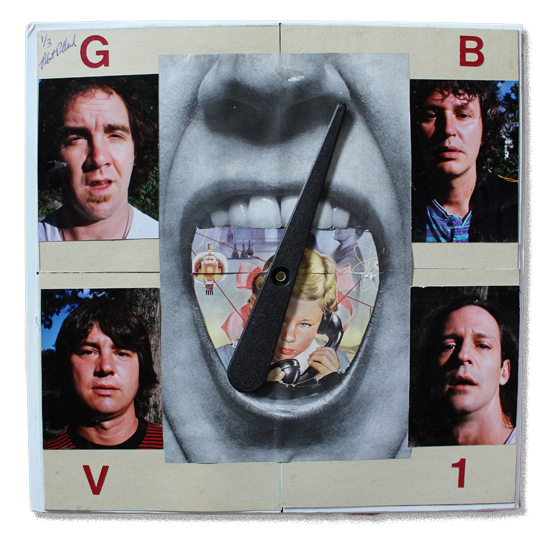
On the eve of Suitcase 4’s release, Robert Pollard reflects on “collage rock” and GBV’s legacy. Pre-order Suitcase 4 here.
Robert Pollard is bent over a long, blue plastic bin at the Goodwill store in Dayton, Ohio. Rows of them stretch through the cavernous, stale-smelling space. Staff members roll out newly filled containers and whisk away empties from the pickers.
“One time I came in here,” says Pollard, the erstwhile songwriting savant of Guided By Voices and many other solo and band projects, “and a bin was just full of knives, all sticking up. There were kids playing around it. I had to get out.”
Past long-outdated World Book encyclopedias, he digs. Firstedition Danielle Steel hardcovers, questionably stained magazines, children’s books long past three hand-me-downs.
“Look at this!” Pollard reels up the catch—a mid-’60s issue of The Journal Of The American Society Of Metals—and flips its pages. He stops at four mottled, black-and-white fi gures and points out an alloy’s molecular structure.
“That’s an album cover. Metal. Yeah.” Pollard’s voice betrays a hint of awe, as though he’s attuned to a groove only he can hear. And maybe he is—he’s been plucking inspiration from the ether his whole life.
Harvesting from Goodwill came later. Pollard found it an excellent source of old shit—items and images to which age imparts an elusive, intrinsic value—for his burgeoning collage art. Searching through musical detritus for gems to polish was also the strategy that created classic Guided By Voices albums Propeller and Bee Thousand.
“Bee Thousand, more so than any other album,” says Pollard, “is comprised of old shit redone.” With his fourth Suitcase e ffort, Captain Kangaroo Won The War, Pollard has again applied collage-making methods to rock ‘n’ roll by selecting long-lost outtakes, sketches and songs. Many never made it into Guided By Voices’ catalog, but some did in altered form. For students of the band’s history, the release unearths vast new strata.
At the same time, it functions as conceptual art, a mock compilation of invented bands. “I’ve got the original version of ‘Echoes Myron’ on there,” Pollard laughs, “called ‘Try Me On For Size.’ I was singing in a really high-pitched voice on the tape, almost like a little girl, so I called that band Rachel Twit.” He sings, to the tune of the track’s opening lines:
“Try me on for size/I’m the one you want to know”
An early take of GBV’s “Wished I Was A Giant” also appears on Kangaroo, recorded circa 1979 with Nick Weiser and John Dodson (both formerly of Dayton punk band the Rulers). Pollard points to that brief musical collaboration as the impetus for his “collage-rock” method.
“They gave me a cassette tape full of fragments of all this shit they’d recorded,” he says. “Just pieces of songs. It was great. That became my credo. It doesn’t have to be fi nished or hi-fi .”
Once he knew to include any piece that fi t the overall picture, Pollard listened to all the old cassettes he could fi nd. Many of the songs he unearthed became classic GBV hits; most have appeared on previous Suitcases.
This is not to say Pollard thinks every discovery is gold. On a few tunes recorded by proto-GBV combo the Crowd, he describes his vocal inflections as “like Morrissey. Really bad stu ff. Like I was gagging,” he chuckles. “I’m laying my balls on the table with that shit.”
But Captain Kangaroo Won The War holds its share of treasure: early versions of “Tractor Rape Chain,” “Goldheart Mountaintop Queen Directory,” “Hardcore UFOs” and others, an alternate take of “Motor Away,” the original “Glad Girls” (an Alien Lanes outtake) and a slew of new pop hooks, earworm melodies and lost snippets.
At the Goodwill store checkout, Pollard piles his future collage inspirations—a vintage, coverless copy of Bunyan’s Pilgrim’s Progress, a kids’ recipe book called Tasty Sharings, “Nursery Time” in an amazing font—on a scale and pays by weight. He puts his change in the Easter Seals collection box.
Asked if he thinks releasing so many unfinished songs will somehow tarnish his legacy, Pollard says no. He’s more interested in recording every inspiration, so the best moments might rise to the top and outlive him.
“Don’t you love great songs?” says Pollard. “Great songs have no ego. Things in the ether can have no ego.”
—Matthew Cutter






